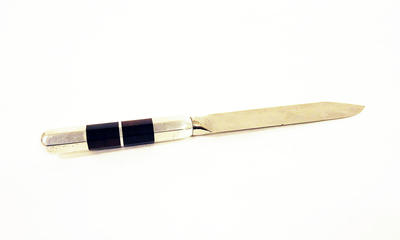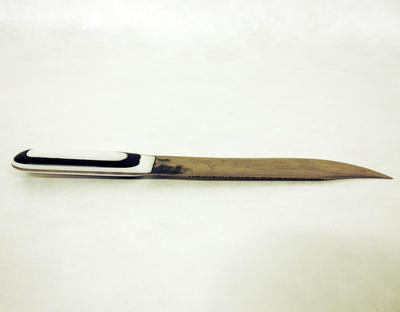Foreigner - Knife
Production date
1937-1938
Country
Australia
State/Province
Queensland
See full details
Object detail
Description
Medium sized knife. Hexagonal section shaped handle with two polished wooden inserts. Bright finish.
Classification
DOMESTIC EQUIPMENT Food & Drink Consumption Cutlery knife
Production date
1937-1938
Production place
Measurements
Dimensions: H20 x W300 x D27 mm
Weight: 200g
Weight: 200g
Media/Materials description
Steel (Metals - Ferrous) Carbon Vanadium Aluminium (Metals - Non-Ferrous) Duralumin Indeterminate (Woods) Queensland Black Bean
History and use
This knife is a ‘foreigner’, produced by workers at the Ipswich Railway Workshops.
A ‘foreigner’ was a piece of work carried out surreptitiously by workers for private purposes, using scraps of metal and timber and odd moments of spare time. By definition, ‘foreigners’ were officially forbidden though it was often overlooked so long as it was kept within reasonable bounds. The concept evolved amongst workers from that of ‘foreign orders’, conducted officially by the Workshops for outside organisations and firms to assist in local industry and other government departments.
Referred to by workers as the ‘take-home fringe benefit’, the practice of producing personal ‘foreigners’ came into question in 1982 in State Parliament, though luckily for many it was excused as being ‘one of the privileges of the job’. Despite this, at times, a relaxed attitude to producing ‘foreigners’ was a risk and workers are known to have been convicted of theft for producing ‘foreigners’, losing their jobs in the process.
Today, many houses in Ipswich still contain these products of skill and ingenuity having emerged from the Workshops. Items could include fishing reels, yabby pumps, kitchen utensils and household goods, home-brewing instruments, garden tools, toys, and even elaborate family gifts (e.g. jewellery boxes). These were often modelled on commercial products, though produced for the private context based on need or creativity, not private enterprise. In many instances, workers from different work areas would collaborate to produce their ‘foreigners’ – for example, a blacksmith might have sought assistance from a Foundry worker for the right scrap resources and skills in casting metal.
How were these objects carried home in secret you might ask? ‘Knock-off time’ at the Workshops was a major event, with the entire workforce (between 1500 and 3500 in the 1900s) pouring through the gates when the whistle blew. This was an opportunity to sneak ‘foreigners’ out, whether wrapped in overalls or stuffed down the legs of a worker’s trousers.
The ‘foreigners’ that the Museum caretakes are representative of just a small portion of the rich history of the Ipswich Railway Workshops. For more insight, refer to 'Behind the Tin Fence: A History of the Ipswich Railway Workshops' (published 2011 as part of Memoirs of the Queensland Museum series).
A ‘foreigner’ was a piece of work carried out surreptitiously by workers for private purposes, using scraps of metal and timber and odd moments of spare time. By definition, ‘foreigners’ were officially forbidden though it was often overlooked so long as it was kept within reasonable bounds. The concept evolved amongst workers from that of ‘foreign orders’, conducted officially by the Workshops for outside organisations and firms to assist in local industry and other government departments.
Referred to by workers as the ‘take-home fringe benefit’, the practice of producing personal ‘foreigners’ came into question in 1982 in State Parliament, though luckily for many it was excused as being ‘one of the privileges of the job’. Despite this, at times, a relaxed attitude to producing ‘foreigners’ was a risk and workers are known to have been convicted of theft for producing ‘foreigners’, losing their jobs in the process.
Today, many houses in Ipswich still contain these products of skill and ingenuity having emerged from the Workshops. Items could include fishing reels, yabby pumps, kitchen utensils and household goods, home-brewing instruments, garden tools, toys, and even elaborate family gifts (e.g. jewellery boxes). These were often modelled on commercial products, though produced for the private context based on need or creativity, not private enterprise. In many instances, workers from different work areas would collaborate to produce their ‘foreigners’ – for example, a blacksmith might have sought assistance from a Foundry worker for the right scrap resources and skills in casting metal.
How were these objects carried home in secret you might ask? ‘Knock-off time’ at the Workshops was a major event, with the entire workforce (between 1500 and 3500 in the 1900s) pouring through the gates when the whistle blew. This was an opportunity to sneak ‘foreigners’ out, whether wrapped in overalls or stuffed down the legs of a worker’s trousers.
The ‘foreigners’ that the Museum caretakes are representative of just a small portion of the rich history of the Ipswich Railway Workshops. For more insight, refer to 'Behind the Tin Fence: A History of the Ipswich Railway Workshops' (published 2011 as part of Memoirs of the Queensland Museum series).
Associated person
Registration number
R5871







